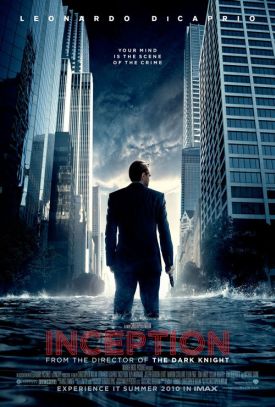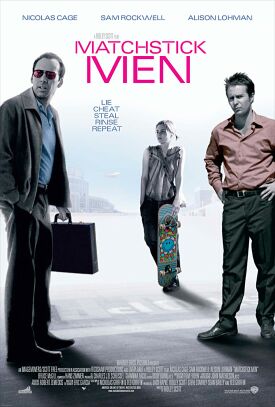Inception
Movie reviewing isn’t what it used to be, I’m sorry to have to tell you. Criticism has ceased to be an aesthetic exercise and is now an essay in mass psychology — or perhaps the sort of practical anthropology known as marketing. Thus, The New Republic online recently ran an article by the estimable David Thomson under the headline: “Why is Everyone So Obsessed with Inception, A Theory.” Not, in other words, “Is Inception any good?” or “Should you go see Inception?” That people want to see it and even should see it can apparently be taken for granted. Though perfectly capable of reviewing movies — I can particularly recommend his Have You Seen . . .? a collection of brief reviews of a thousand of his favorite pictures — Mr Thomson rightly concludes that Christopher Nolan’s movie, soaring atop the box office charts, is more a subject for an alienist than a critic.
Anyway, I mean to emulate this new, po-mo style of criticism here. Just as the movie itself consists mainly of allusions to other movies — as A.O. Scott remarks in The New York Times, it is “as packed with allusions and citations as a film studies term paper” — so will my review consist mainly of reviews of other reviewers, beginning with David Thomson. As I read his theory — and I hope he will correct me if I am wrong — the real (or, rather, unreal) appeal of Inception lies in a new kind of artistry, namely that of pure cinema utterly unconnected to anything outside itself in the world formerly known as “real.” What it has to offer is not a picture of something — that is, something else — but a sort of Kantian ding an sich, the thing in itself, plus a degree of wit and grace (these are his words) that has the power to make us forget any lingering soul-hunger we may have for the old-fashioned kind of movie, namely one which presupposed a connection to reality.
Sure it’s the equivalent of a video game, Mr Thomson cheerfully admits, but what’s so bad about that?
As I go back to it, and we all will, I think this truth will emerge, that amid its stunning visions of Paris folding up like a clever box and cliffs crumbling like abandoned tenements, it has the panache of a comedy. Leonardo [DiCaprio] and his gang do a great job with their inane task, but it could have been Laurel and Hardy getting a piano up those steps.
Of course, the difference is that both pianos and steps are recognizable phenomena of our common life. Put them together for comic effect and you have one thing; put a bunch of imaginary somnionauts, led by Mr DiCaprio’s Dom Cobb, into an inverted and metaphysical heist-caper in a computer-generated landscape full of nothing but artful allusions to other artificial images and you have, well, quite another. But this truth doesn’t really affect Mr Thomson’s basic point that, when you’ve got a video game as pretty and as cleverly designed as Inception, it gives you a kind of permission (as the psychoanalyst might say) to abandon our out-dated and unnecessary expectations of plausibility and verisimilitude: in short, of “reality,” — a word which can thus henceforth never again be used without its bodyguard of quotation marks.
Well, maybe so, but I can’t help thinking of the revealing comment from Ann Hornaday’s review in The Washington Post: “Indeed, Inception often plays like the coolest Ocean’s Eleven installment ever made, albeit with fewer wisecracks and a much trippier caper.” That Ocean’s Eleven takes place, ostensibly, in the real world is an irrelevancy here, since we know how unreal, how purely cinematic it is, just like Inception. Once having swallowed the somewhat more timorous fantasy of Ocean’s Eleven, what is to stop us from swallowing the completely fantastical Inception? Fantasy can now be taken for granted as the only vehicle for originality and intelligence in movie-making. See, for instance, Ms Hornaday’s further compliment:
Nolan exemplifies the best kind of filmmaking, unchained from the laws of time, space and even gravity, but never from the most basic rules of narrative. Even at its most tangled and paradoxical, Inception keeps circling back to the motivation that has driven films from The Wizard of Oz to E.T.: Cobb, finally, just wants to go home.
There is an important mistake here. “The most basic rules of narrative,” like narrative itself, must refer to action. Narrative means that something happens, which then causes something else to happen. Wanting to go home isn’t an action but a feeling, and in this movie, as in so many others these days, there is only feeling and no action. Or rather, what actions there are can hardly be disentangled from what are only the illusions of actions. Why? Because the conversion of action into illusion is what people are demanding of movies these days instead of demanding, as they used to do, the conversion of illusion into action.
That’s why the editorial (again, not a review) in the Guardian that claims “Nolan is emerging as a master storyteller” has it exactly wrong. This is just what he’s not, since “story” (a.k.a. “narrative”) must take action seriously enough to acknowledge that it has consequences. One action, therefore, leads to another. They used to call it plot. The whole point of dealing in dreams is so that you can dispense with plot, since in dreams there are no actions in the sense of things-with-consequences. Anything can happen, and that’s the way this non-story-teller likes it. It’s also how audiences increasing numbers of whose members spend their lives in front of computer screens seem to like it.
Or, as Tom Shone wrote in the London Daily Telegraph, “For all its originality, the movie offers startling confirmation of a theme that first emerged in James Cameron’s Avatar: audiences have had it with reality.” I’m afraid that’s true, except that the theme did not first emerge in Avatar but decades ago in Star Wars and the Indiana Jones sagas: fantasies that no longer bothered even masquerading as reality. Christopher Nolan has done as much as anyone to advance this anti-reality style of film-making, not least in The Dark Knight which proved, even before Avatar, that phantasmagoria could take the place of plot and no one would even notice or, if they did notice, care about it. In case I haven’t mentioned it before, I do care. I’m sure someone else must have said so too; I just can’t think of who at the moment.
Discover more from James Bowman
Subscribe to get the latest posts to your email.






